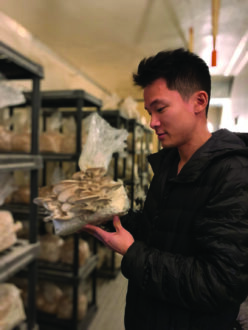Research projects can at times lead to unanticipated results. While working to identify an alternative and sustainable source of carbon dioxide (CO2) generation for enriching plant chambers within the growing vertical farming industry as a graduate student at the University of Arizona, Justin Chung discovered the potential benefits for sustaining astronauts in long duration missions.
The controlled environment vertical farming industry has steadily grown over the past few years and is seen by many as a positive step towards sustainable and resource-use efficient food production. However, these operations require a high level of CO2 to support healthy crop growth. CO2 can be administered through injection from pressurized cannisters or using a generator that is run on natural gas or propane. Injection is not cost efficient, and the burning of natural gas or propane increases the carbon footprint of that vertical farm.
Chung studied linking specialty mushroom cultivation chambers with plant cultivation chambers via air exchange, with the idea that CO2 respiration from the mycelium during incubation could enrich leafy plants during photosynthesis. His research focused on which specific species, substrates, and environmental conditions would be ideal for urban agriculture.
“It was discovered that Trametes versicolor, colloquially known as “turkey tail,” produced the highest amount of carbon dioxide when grown on a substrate mix of mesquite/alfalfa. These wonderful mushrooms not only contain powerful medicinal compounds used in cancer therapy, but also can be used to enrich plant growth in closed systems to optimize photosynthetic activity.”
Chung hosted webinars about his findings that were attended by people just starting out in mushroom cultivation and those who could supplement their existing operations with mushrooms. These mushroom producers work in both urban controlled environment facilities and outdoor farms using shipping containers to grow the mushrooms.
As a graduate student, Chung was interested in sustainability, hydroponics, and vertical farming. Having always been curious about mushrooms, he was excited to work with his mycology professor on linking plant chambers with mushrooms. He learned about the potential that fungi have for a more sustainable future in both food production and converting waste. The research on mycelium is just scratching the surface.
“Specialty mushrooms represent a very exciting and growing market,” says Chung. “People are interested in the functional benefits, as well as an alternative protein source. Mushroom production is water-use and space efficient.”
Chung is excited to further his research in his career at an urban farm in Phoenix.
“I’m currently working at Southwest Mushrooms, an urban mushroom farm, which has given me the opportunity to apply what I’ve learned to a start-up environment. Harnessing the power of mycelium to transform agro-industrial waste into high quality sources of mycoprotein and medicinal compounds brings immense value to local communities!”
As Chung worked on his project, he realized important applications for long duration crewed missions. He was excited about the potential to bring the fungal kingdom into outer space.
“The abundant production of CO2 during fungal growth has numerous applications in controlled environment agriculture and Bioregenerative Life Support Systems. My colleague Sean Gellenbeck has been able to utilize the findings from this research environment to develop an integrated system to support astronauts in outer space applications, which is incredibly exciting as we approach the possibility of terraforming other terrestrial bodies.”
